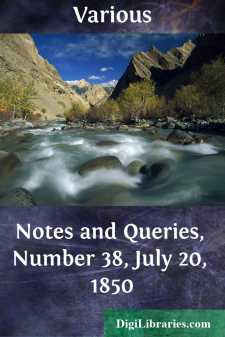Categories
- Antiques & Collectibles 13
- Architecture 36
- Art 48
- Bibles 22
- Biography & Autobiography 813
- Body, Mind & Spirit 142
- Business & Economics 28
- Children's Books 17
- Children's Fiction 14
- Computers 4
- Cooking 94
- Crafts & Hobbies 4
- Drama 346
- Education 46
- Family & Relationships 57
- Fiction 11829
- Games 19
- Gardening 17
- Health & Fitness 34
- History 1377
- House & Home 1
- Humor 147
- Juvenile Fiction 1873
- Juvenile Nonfiction 202
- Language Arts & Disciplines 88
- Law 16
- Literary Collections 686
- Literary Criticism 179
- Mathematics 13
- Medical 41
- Music 40
- Nature 179
- Non-Classifiable 1768
- Performing Arts 7
- Periodicals 1453
- Philosophy 64
- Photography 2
- Poetry 896
- Political Science 203
- Psychology 42
- Reference 154
- Religion 513
- Science 126
- Self-Help 84
- Social Science 81
- Sports & Recreation 34
- Study Aids 3
- Technology & Engineering 59
- Transportation 23
- Travel 463
- True Crime 29
Notes and Queries, Number 38, July 20, 1850
by: Various
Categories:
Description:
Excerpt
NOTES.
WHAT IS THE MEANING OF "DELIGHTED," AS SOMETIMES USED BY SHAKSPEARE.
I wish to call attention to the peculiar use of a word, or rather to a peculiar word, in Shakspeare, which I do not recollect to have met with in any other writer. I say a "peculiar word," because, although the verb To delight is well known, and of general use, the word, the same in form, to which I refer, is not only of different meaning, but, as I conceive, of distinct derivation the non-recognition of which has led to a misconception of the meaning of one of the finest passages in Shakspeare. The first passage in which it occurs, that I shall quote, is the well known one from Measure for Measure:
"Ay, but to die, and go we know not where;
To lie in cold obstruction, and to rot,
This sensible warm motion to become
A kneaded clod; and the delighted spirit
To bathe in fiery floods, or to reside
In thrilling regions of thick-ribbed ice;
To be imprison'd in the viewless winds
And blown with restless violence round about
The pendant world." Act iii. Sc. 1.
Now, if we examine the construction of this passage, we shall find that it appears to have been the object of the writer to separate, and place in juxtaposition with each other, the conditions of the body and the spirit, each being imagined under circumstances to excite repulsion or terror in a sentient being. The mind sees the former lying in "cold obstruction," rotting, changed from a "sensible warm motion" to a "kneaded clod," every circumstance leaving the impression of dull, dead weight, deprived of force and motion. The spirit, on the other hand, is imagined under circumstances that give the most vivid picture conceivable of utter powerlessness:
"Imprison'd in the viewless winds,
And blown with restless violence round about
The pendant world."
To call the spirit here "delighted," in our sense of the term, would be absurd; and no explanation of the passage in this sense, however ingenious, is intelligible. That it is intended to represent the spirit simply as lightened, made light, relieved from the weight of matter, I am convinced, and this is my view of the meaning of the word in the present instance.
Delight is naturally formed by the participle de and light, to make light, in the same way as "debase," to make base, "defile," to make foul. The analogy is not quite so perfect in such words as "define," "defile" (file), "deliver," "depart," &c.; yet they all may be considered of the same class. The last of these is used with us only in the sense of to go away; in Shakspeare's time (and Shakspeare so uses it) it meant also to part, or part with. A correspondent of Mr. Knight's suggests for the word delight in this passage, also, a new derivation; using de as a negation, and light (lux), delighted, removed from the regions of light. This is impossible; if we look at the context we shall see that it not only contemplated no such thing, but that it is distinctly opposed to it.
I am less inclined to entertain any doubt of the view I have taken being correct, from the confirmation it receives in another passage of Shakspeare, which runs as follows:
"If virtue no delighted beauty lack,
Your son-in-law shows far more fair than black."
Othello, Act i....












